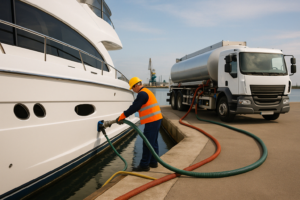
In the fast-evolving maritime industry, fueling solutions are adapting to meet the growing demand for efficiency, convenience, and environmental compliance. One innovation making a significant impact is dockside fuel delivery—a service model that brings high-quality fuel and lubricants directly to boats, ships, and offshore operations. This method is redefining marine fuel supply by streamlining logistics and supporting cleaner, more reliable operations at sea.
Dockside Fueling: A Smarter Approach to Marine Energy
Dockside fuel delivery is transforming the way vessels refuel by eliminating the need for travel to onshore fueling stations. Instead, fuel is brought directly to marinas, harbors, and even offshore sites. This on-demand model reduces downtime, lowers fuel consumption during transit, and improves operational efficiency—an especially critical factor for commercial vessels, fishing fleets, and offshore service companies.
In coastal areas across the U.S., providers are leveraging this model to offer not just convenience, but also premium service. Companies specializing in marine fuel and lubricants are aligning with leading energy partners to ensure a reliable and compliant fuel supply that meets modern emissions standards.
Strategic Partnerships Strengthening the Supply Chain
To deliver dependable dockside fueling services, marine energy providers are turning to trusted names in the fuel distribution industry. Partnerships with companies like Mansfield Energy Corp allow dockside fuel services to access a robust infrastructure for sourcing and logistics. Mansfield’s national network ensures availability of clean fuels, including biodiesel and ultra-low sulfur diesel, to support sustainable operations.
Likewise, distributors such as O’Rourke Petroleum Products are enhancing the dockside fueling experience by supplying high-performance marine lubricants, specialty fuels, and crucial products like DEF supply (diesel exhaust fluid). DEF is vital for vessels equipped with selective catalytic reduction (SCR) systems, helping them reduce NOx emissions and remain in regulatory compliance.
These collaborations make it possible for dockside services to provide tailored fueling programs based on vessel type, route, and usage—all delivered with speed and precision.
Offshore Marine Fueling: Reaching Beyond the Dock
The benefits of dockside delivery don’t stop at the shoreline. For offshore operations, including oil rigs and research vessels, offshore marine fueling is a logistical lifeline. Coordinated through experienced marine fuel companies, offshore fueling extends the same advantages—timely service, fuel quality assurance, and reduced logistical headaches—to even the most remote marine assets.
Whether it’s a large ship stationed miles from shore or a tugboat in a local harbor, the flexibility and responsiveness of dockside and offshore fueling models ensure that vessels stay on schedule and in compliance.
Driving the Future of Marine Fuel Supply
As global shipping and marine operations continue to expand, traditional fueling methods are being reimagined to support more agile and environmentally responsible practices. Dockside fueling is at the forefront of this shift, backed by strong industry partnerships with major players like Mansfield Oil Company and O’Rourke Petroleum Products.
This modern marine fuel model combines the reliability of large-scale fuel suppliers with the personalized service of dockside logistics. The result is a comprehensive, efficient, and scalable solution that meets the unique demands of today’s marine industry.
Dockside fuel delivery is more than a convenience—it’s a game-changer for the marine energy sector. With trusted partners, advanced logistics, and a focus on quality and compliance, this service model is redefining how marine fuel is accessed and delivered. As the demand for cleaner and more efficient marine operations grows, dockside and offshore marine fueling will play a crucial role in keeping the industry moving.
For operators looking to stay ahead in a competitive and increasingly regulated market, embracing this next-gen approach to marine fuel supply is not just smart—it’s essential.


